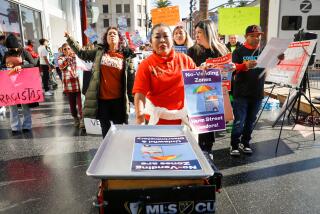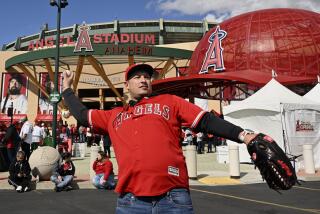Black-Korean Truce Termed ‘Very Fragile’ : Ethnic relations: The two sides offer differing interpretations of pact to end boycott. City officials say there is more work to be done.
- Share via
On the day after Korean-American merchants and black activists struck a deal to end a summer-long boycott of a South-Central Los Angeles grocery store, the key players made it clear that a lasting truce may be difficult to achieve and that the accord is, at best, a fragile one.
The settlement negotiated by Mayor Tom Bradley’s office suspended the 109-day boycott sparked by the June 4 shooting death of a black man by a Korean-American liquor store owner. Under the settlement, the store is to be closed and offered for sale, initially to black buyers.
Among other things, the agreement bars the future sale of liquor at the store and includes a pledge by both ethnic communities to work toward establishing “a dispute resolution process” aimed at avoiding future boycotts.
“This is only the starting point for a lot more work that has to be done to try to get the Korean community and the African-American community to understand each other,” said City Councilman Michael Woo, who participated in the talks. “It will take more than a piece of paper.”
The truce was the product of frantic behind-the-scenes negotiations this week by the mayor’s office with both black and Korean-American leaders--some of whom said they went along with the plan because they felt they had no alternative.
“This is not the best deal,” said Duk H. Kang, president of the city’s Korean Chamber of Commerce. “But what can be done? We have no choice. We have to stop it, this boycott, right now. We don’t want it to go to another store and another store and another store.”
For Korean-Americans, the truce means that they must come to terms with the fact that store owner Tae Sam Park--who was cleared by police in the fatal shooting of Lee Arthur Mitchell--will lose his business in the interests of ethnic peace.
“Some Koreans are thinking, he’s given up his store even though he hasn’t done anything wrong, so what’s to stop other black groups from boycotting other stores?” said Jerry Yu, executive director of the Korean-American Coalition, a civil rights group. “It sort of sets a precedent.”
As for blacks, they must accept the fact that the boycott has ended without an agreement by authorities to reopen the investigation of Mitchell’s death--a key concession on their part. They also dropped their demand to retain total control over who buys the store, agreeing to a plan that gives them the exclusive right to negotiate a sale for 30 days.
City officials who orchestrated the agreement are left hoping that the delicate truce will hold.
“Trust has to be built up on both sides,” said Deputy Mayor Mark Fabiani, the mayor’s key negotiator. “And that’s going to be a slow process.”
The fragile nature of the agreement became immediately apparent. Rather than convene a joint news conference, each side announced the news on its own. Korean-American leaders held a news conference Thursday night, while boycott leaders held one Friday morning. The two sides offered contrasting interpretations of the accord.
Boycott leaders, jubilant as they gathered outside the just-closed liquor store Friday morning, claimed victory as passing motorists honked their horns in support. Although Brotherhood Crusade President Danny Bakewell--a leading force behind the boycott--praised Korean-American leaders, his remarks were less than conciliatory.
“What is significant about today is that we are winning,” he declared. “We have brought home the bacon.”
Bakewell announced provisions not contained in the agreement released by the mayor’s office, including a 10-point “code of ethics” requiring all South-Central Los Angeles merchants to hire at least one black in their businesses. He also said his group will renew its request to the district attorney for a new investigation of the Mitchell shooting.
Bakewell announced, moreover, that as part of the agreement to end the boycott, negotiations are under way with Korean-American bankers to establish a pool of capital to help African-American entrepreneurs get started in business.
Finally, Bakewell said he was not ruling out future boycotts and urged followers to “come out in force” Monday to protest against a ruling in the trial of another Korean-American merchant, Soon Ja Du, who shot a black teen-ager to death. The judge in the case ruled that Du, who was charged with first-degree murder, should face a charge of no more than second-degree murder because there was insufficient evidence of premeditation.
Korean-American leaders were taken aback by Bakewell’s statements.
“I don’t know what to say,” said an incredulous Yumi Park of the Korean-American Grocers Assn. of Southern California when told that Bakewell said he wanted the investigation of the Mitchell shooting reopened. “I’m kind of curious about that.”
Additionally, the Korean-American group said the agreement is not as sweeping as Bakewell has suggested.
“What the two parties agreed upon is about the issue of the liquor store on 79th and Western, and how do we bring an end to that (boycott),” said Yoon Hee Kim, a mayoral adviser speaking for a group of Korean-American leaders gathered Friday in Bradley’s office. “It’s not about all those other things.”
Deputy Mayor Fabiani confirmed that Bakewell’s 10-point code of ethics had not been agreed on either by Korean-American groups or by other black groups.
“Clearly, he (Bakewell) has a lot to say about events in South-Central Los Angeles,” Fabiani said. “He is a charismatic and articulate figure, but it is naive to think that one person will dominate these discussions.”
In its efforts to make the truce stick, the mayor’s office is trying to bring a broader array of black and Korean-American leaders into the peacemaking process.
Fabiani said leaders of the NAACP and the Southern Christian Leadership Conference, among others, have already been working with Korean-Americans to draw up a merchants’ code of ethics.
Early in the boycott, Bradley--who had opposed it from the start--tried to meet with Bakewell but was rebuffed.
Bakewell vowed that he would not negotiate with anyone until the boycott reached its 90th day--a stance that strained his friendship with Bradley and drew criticism from the County Human Relations Commission.
A source close to the negotiations said some city leaders, including Councilman Woo, tried to get other black leaders to help break the impasse. But the attempts did not work, the source said, because other black leaders did not want to appear to be at odds with Bakewell.
“Privately, they loved to criticize him, but publicly, they were afraid to cross him,” according to the source. “There were a lot of leaders who felt that this (the boycott) was the wrong way to go, but they felt paralyzed.”
In mid-September, when the boycott reached its 90th day, Bakewell and other community activists announced the formation of the African American Honor Committee, which would monitor businesses in South-Central Los Angeles and perhaps find new boycott targets. At that time, Bakewell also announced that the committee would be willing to come to the negotiating table.
About the same time, officials of the Korean Grocers Assn., primarily Yang Il Kim, the group’s national president, were trying to come up with a resolution. For the first time, they began indicating to the mayor’s office their willingness to press the store’s owner to close his doors in exchange for an end to the boycott.
“What I got from Mr. Kim was a fierce determination to grab this issue and deal with it,” Fabiani said.
By Monday, the two sides met face-to-face for the first time in a session organized by Bradley’s aides and held at the offices of the Southern Christian Leadership Conference. According to key participants, Kim raised the possibility of selling the store as part of an agreement to end the boycott, but Bakewell insisted that the sale would have to occur before the picketing would stop.
The following day, the mayor’s office came up with the first draft of the final agreement, which called for simultaneous concessions: closing the store and ending the boycott at the same time.
In the end, the agreement almost became a victim of protocol, with the two sides unable to agree on how it should be announced. The Korean-Americans wanted to hold a joint news conference, but their leaders were leaving town Friday morning.
At the same time, Bakewell indicated he was going to hold a news conference after they left. That panicked city officials, who envisioned a scenario in which Bakewell would announce that he had made an offer in good faith, only to have the Korean-Americans leave town without responding.
In a flurry of last-minute activity Thursday, the mayor’s aides raced to convene a late-night meeting of Korean-American leaders who were gathered at a banquet at a Universal City hotel. Huddled over a table in the hotel lobby while the banquet went on without them, the leaders agreed to announce the accord on the spot.
More to Read
Sign up for Essential California
The most important California stories and recommendations in your inbox every morning.
You may occasionally receive promotional content from the Los Angeles Times.













